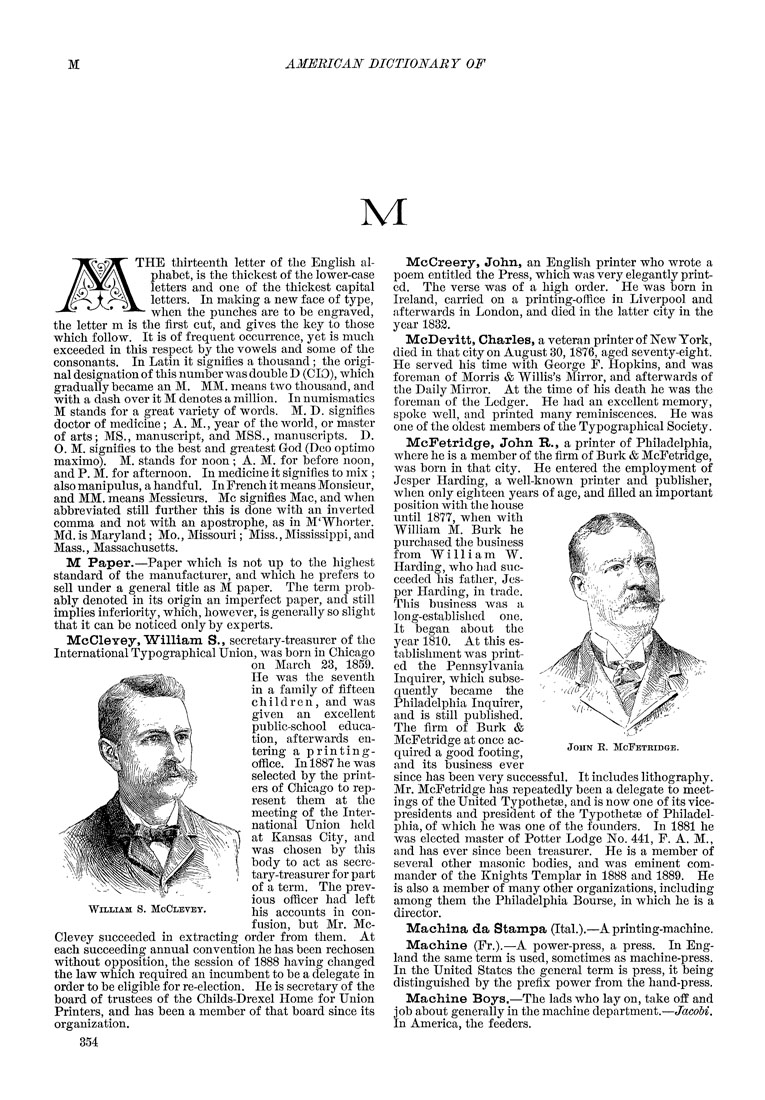M
AMERICAN DICTIONARY OF
M
THE thirteenth letter of the English al¬
phabet, is the thickest of the lower-case
letters and one of the thickest capital
letters. In making a new face of type,
when the punches are to be engraved,
the letter m is the first cut, and gives the key to those
which follow. It is of frequent occurrence, yet is much
exceeded in this respect by the vowels and some of the
consonants. In Latin it signifies a thousand ; the origi¬
nal designation of this number was double D (CIO), which
gradually became an M. MM. means two thousand, and
with a dash over it M denotes a million. In numismatics
M stands for a great variety of words. M. D. signifies
doctor of medicine ; A. M., year of the world, or master
of arts; MS,, manuscript, and MSS,, manuscripts, D.
O. M. signifies to the best and greatest God (Deo optimo
maximo). M. stands for noon; A. M. for before noon,
and P. M. for afternoon. In medicine it signifies to mix ;
also manipulus, a handful. In French it means Monsieur,
and MM. means Messieurs. Mc signifies Mac, and when
abbreviated still further this is done with an inverted
comma and not with an apostrophe, as in M'Whorter.
Md. is Maryland; Mo., Missouri; Miss,, Mississippi, and
Mass., Massachusetts.
M Paper.—Paper which is not up to the highest
standard of the manufacturer, and which he prefers to
sell under a general title as M paper. The term prob¬
ably denoted in its origin an imperfect paper, and still
implies inferiority, which, however, is generally so slight
that it can be noticed only by experts.
Mc Cie YOy, "William S., secretary-treasurer of the
International Typographical Union, was born in Chicago
on March 23, 1859.
He was the seventh
in a family of fifteen
children, and was
given an excellent
public-school educa¬
tion, afterwards en¬
tering a printing-
office. In 1887 he was
selected by the print¬
ers of Chicago to rep¬
resent them at the
meeting of the Inter¬
national Union held
at Kansas City, and
was chosen by this
body to act as secre¬
tary-treasurer for part
of a term. The prev¬
ious officer had left
his accounts in con¬
fusion, but Mr. Mc¬
Clevey succeeded in extracting order from them. At
each succeeding annual convention he has been rechosen
without opposition, the session of 1888 having changed
the law which required an incumbent to be a delegate in
order to be eligible for re-election. He is secretary of the
board of trustees of the Childs-Drexel Home for Union
Printers, and has been a member of that board since its
organization.
354
William S. McClevey.
McCreery, John, an English printer who wrote a
poem entitled the Press, which was very elegantly print¬
ed. The verse was of a high order. He was born in
Ireland, carried on a printing-office in Liverpool and
afterwards in London, and died in the latter city in the
year 1832.
McDeYitt, Charles, a veteran printer of New York,
died in that city on August 30,1876, aged seventy-eight.
He served his time with George F, Hopkins, and was
foreman of Morris & Willis's Mirror, and afterwards of
the Daily Mirror. At the time of his death he was the
foreman of the Ledger. He had an excellent memory,
spoke well, and printed many reminiscences. He was
one of the oldest members of the Typographical Society,
McPetridge, John R., a printer of Philadelphia,
where he is a member of the firm of Burk & McFetridge,
was born in that city. He entered the employment of
Jesper Harding, a well-known printer and publisher,
when only eighteen years of age, and filled an important
position with the house
until 1877, when with
Wilham M. Burk he
purchased the business
from William W.
Harding, who had suc¬
ceeded his father, Jes¬
per Harding, in trade.
This business was a
long-established one.
It began about the
year 1810. At this es¬
tablishment was print¬
ed the Pennsylvania
Inquirer, which subse¬
quently became the
Philadelphia Inquirer,
and is still published.
The firm of Burk &
McFetridge at once ac¬
quired a good footing,
and its business ever
since has been very successful. It includes lithography.
Mr. McFetridge has repeatedly been a delegate to meet¬
ings of the United Typothetse, and is now one of its vice-
presidents and president of the Typothetse of Philadel¬
phia, of which he was one of the founders. In 1881 he
was elected master of Potter Lodge No, 441, F, A. M,,
and has ever since been treasurer. He is a member of
several other masonic bodies, and was eminent com¬
mander of the Knights Templar in 1888 and 1889, He
is also a member of many other organizations, including
among them the Philadelphia Bourse, in which he is a
director.
Machina da Stampa (Ital,).—A printing-machine.
Machine (Fr.).—A power-press, a press. In Eng¬
land the same term is used, sometimes as machine-press.
In the United States the general term is press, it being
distinguished by the prefix power from the hand-press.
Machine Boys.—The lads who lay on, take off and
job about generally in the machine department.—Jacohi.
In America, the feeders.
John R. McFeteidge.
|








